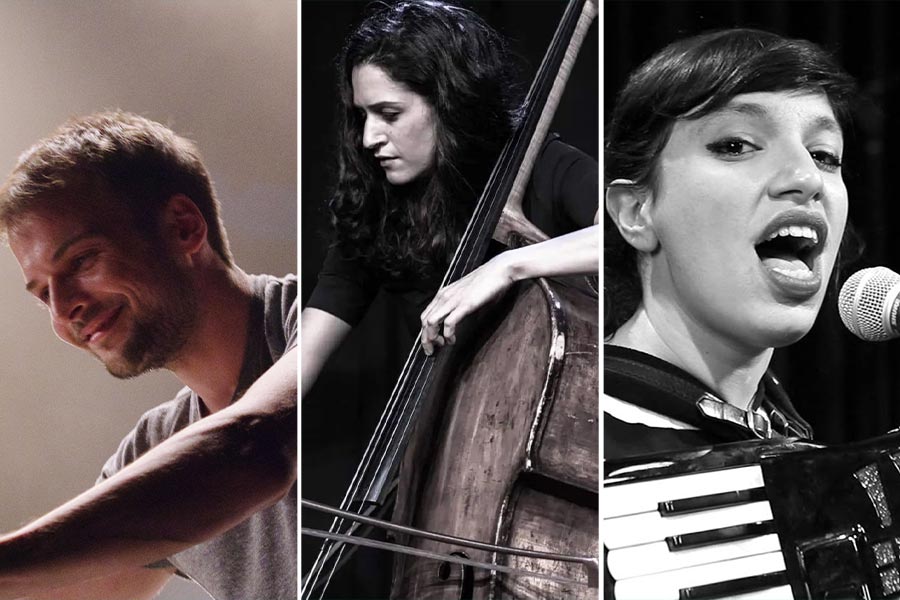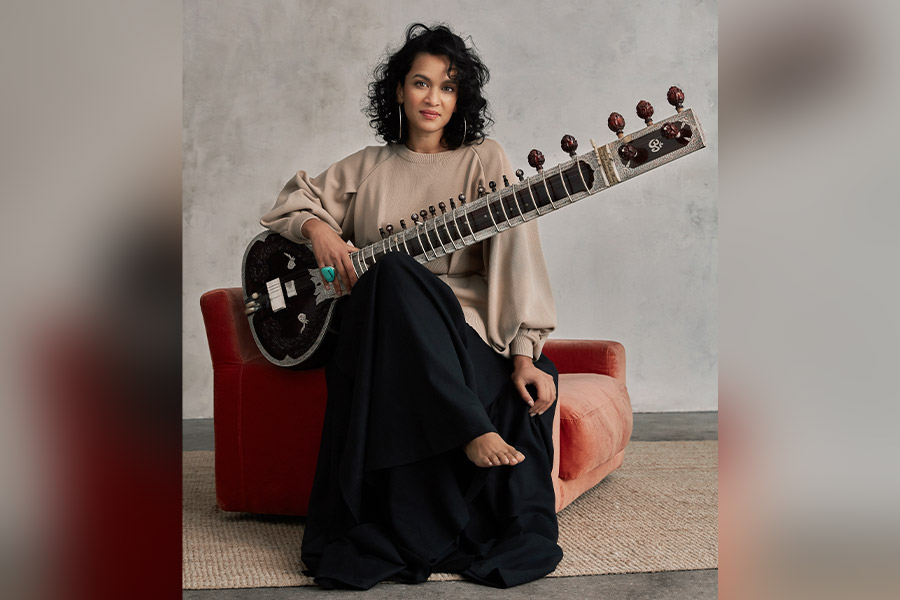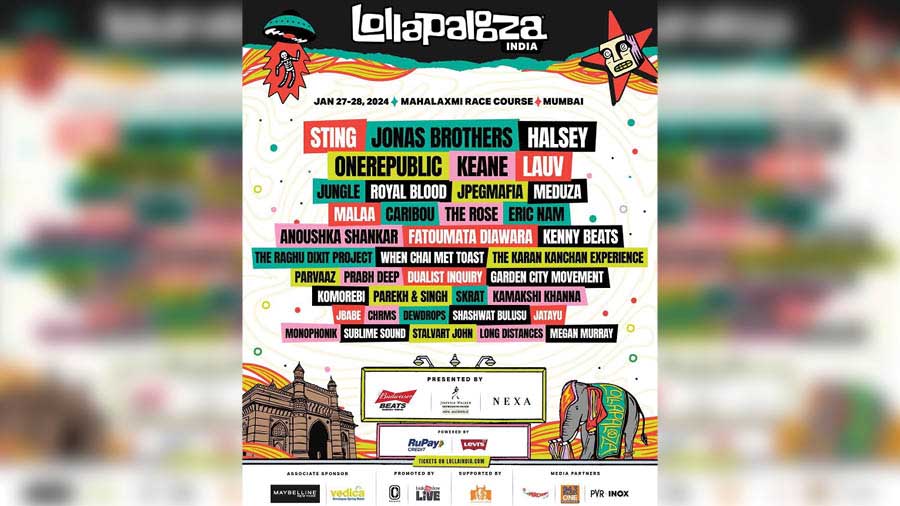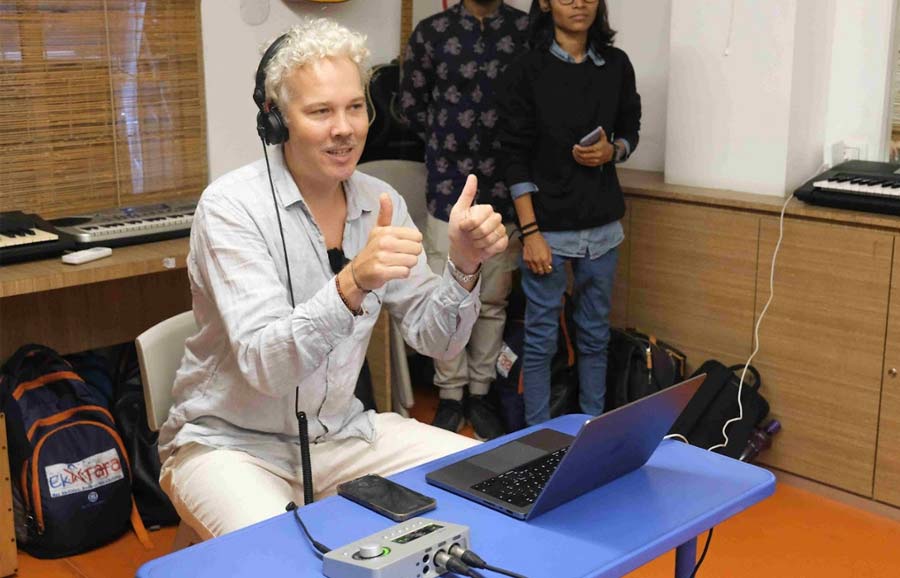Acclaimed sitar virtuoso, film composer and the youngest and the first woman to receive a British House of Commons Shield in recognition of her artistry, Anoushka Shankar is a person of multifaceted talent. As the daughter of Pandit Ravi Shankar, the legendary sitar maestro, she was immersed in music from a young age, learning the intricacies of the sitar under her father’s guidance.
Her musical journey started early when she made her public performance debut at the age of 13 alongside her father. From there, Anoushka Shankar has established herself as a sitarist with a unique blend of traditional classical techniques and innovative contemporary styles. She has carved her own path in the world of music where her repertoire spans several genres, merging classical Indian ragas with elements of flamenco, jazz, electronica and other diverse musical influences. As a teenager, she had also been attracted to the hypnotic quality of Goa trance, the electronic dance music style that originated in the early 1990s in Goa, and which, in her own words, offered her a “different outlet”.
On a more current note, the sitarist is set to kick off her Live In India tour in January 2024, with Bengaluru, Hyderabad, Mumbai, Pune and Delhi on the list of cities she would visit. One of her stops will be at Lollapalooza India, a music festival with four stages and 40-plus artistes, at the Mahalaxmi Race Course in Mumbai where iconic names from the world of music, such as Sting, the Jonas Brothers, Halsey, One Republic and Keane, are also scheduled to perform.
My Kolkata spoke to the artiste who last performed in India in 2022. Edited excerpts follow
My Kolkata: Indian music lovers are excited to catch Anoushka Shankar live in India, especially your gig at Lollapalooza. How does it feel to be part of such an esteemed lineup and touring India again?
Anoushka Shankar: Both are wonderful. Lollapalooza is only in its second year but has already made an impact. I’m looking forward to being a part of the festival and playing for a festival crowd again, which I haven’t done for a while in India. Alongside that, I’m really happy that we’ll be part of a larger tour where we would present a fuller concert in concert halls. It’s always a joy to be back and play for people.
When you perform on an Indian stage compared to when you perform on an international stage, is there any difference in how people perceive your music?
I don’t find any difference because global audiences are well-versed in our music. My audience is with me wherever I go, which is wonderful. I could be playing in a major city anywhere in the world, including India, and the audience might have a similar level of appreciation or response to the music. The only difference is that there’s a slight extra sentiment that [I feel] for the audience [in India] because that’s where my music and I come from. So, playing there [in India] has a kind of special quality to it, which is different from other places.
From piano to sitar, a shift of focus
A fun fact that you shared on Instagram is that when you were younger, the piano was your favorite instrument and you studied it alongside the sitar. So, how did the sitar become your professional instrument of choice?
That’s a good question. It happened slowly because the piano is something I had always been drawn to and playing it had a lack of pressure unlike with the sitar. It felt like something I was doing for myself and my joy. Then, as I started performing with the sitar and continued to play it over the years, I grew to love the act of performing on it more and more. When I was about 17, the sitar became more of a love.
Around that time, I was struggling to keep both the instruments at a certain classical level of performance, along with my studies and so on. So, it just felt like a natural shift to focus more on the sitar while the piano became more of a hobby. It has come back into my life in a different way, but not on a concert stage (laughs).
We read on your website that you were really into Goa psytrance at one point. What was it about the high-BPM genre that attracted you to this dance music style?
I’ve always loved dancing and it was the genre that I found as a teenager. That was my entry onto dance floors and being able to lose myself, listen to loud music and be with friends. The music itself was deeply hypnotic, obviously trancey. But also, it was a complete counter to the music I made and studied. In one part of my life, I was touring around the world and being my dad’s good little girl on stage, playing the correct music, saying everything right and doing everything right. And then, in private, I loved listening to much darker, harder and louder music, and it just gave me a different outlet.
‘Forever, For Now’, and the idea of transience
Coming to your latest work, Chapter One: Forever, For Now is out with four songs. Can you tell us about the significance of the name that you’ve given it?
I was struck by the transient nature of our lives and the things in it, especially in recent times. I suddenly had a moment of clarity with the phrase, “forever for now”, where we think something is forever but it’s only for now. As humans, we don’t know what it’s going to be. All the songs in Forever, For Now really toy with that idea of transience and moments and just try to capture those fleeting moments and be fully present for them.
Coming to the music video of Daydreaming (from Forever, For Now: Chapter One), where you wrote a snippet about your son, and how you would hum the songs to him, can you tell us a little bit about that story?
Daydreaming is the only song in the collection that’s based on a prior composition, which is Madhava Mamava sung in the Carnatic tradition. I had heard it as a kid when my mom and my grandmother would sing it to me. It was a song that moved me because it struck that nostalgic childhood chord. It just so happened that on a summer’s day in the garden with my boys, I was just trying to multitask as you do as a single mom. One was on the trampoline, one was on my lap and I was practising. He fell asleep on my lap.
Somehow, my fingers found that melody and I started playing the song and it just felt so peaceful. I liked this interpretation, which is very stripped-down and slow. So, I decided to do a version with Nils [Frahm, musician and composer] that was just sitar and piano. I was just trying to recapture that feeling of being in the garden that day.
You have decided to release three different chapters of the album every few months. What led to this decision and how is it different from releasing a full-length album?
It’s been interesting because the process is ongoing. When I’m touring with Chapter One, I’m hearing the audience respond to it when I’m playing it… life is informing me about the process in a reciprocal way. If you’ve made a complete album, it’s out all in one go. I found it creatively freeing [to release chapters] because it means that I’ve changed my thinking on these chapters and it’s been about capturing moments. I’ll have an idea or a feeling simmering in my head or my heart for a long time, but the process is getting to the studio with a blank slate and trying to capture those magical takes. It’s about spending a year getting lost in the technical aspects of it to make music and releasing it slightly more immediately with people.
Treating every tradition with respect
We want to circle back to your genre-bending style of music. How do you approach blending these diverse musical styles while still honouring the essence of the classical Indian music that you do?
That is such a good question and it can be hard to answer because I don’t have one rule. What it boils down to is what the integrity of that song is. If the character of that music demands it, then we stay authentic to the raga, the taal or the rhythmic cycle. If the character of the song is in a different direction, then I depart from my tradition. I will play a melody that’s not the raga. I will allow a chord to sit underneath it, something that maybe doesn’t have a note that’s in the raga. Those are choices that I have to make carefully.
The second approach is ensuring that every tradition is being treated with the same respect. If I’m coming from my tradition and I wince at something, would someone else wince if I had done something to their music that they know better? There has to be the same kind of quality control.

Guest appearances were made by (L-R) Nils Frahm (piano, glass harmonica, harmonium, slit drum), Gal Maestro (bass) and Magda Giannikou (accordion) in Chapter One: Forever, For Now
As a solo performer, you’ve achieved many milestones in your career, but when or what was that point in your life where you told yourself, ‘Now I am my own artiste’?
I suppose that’s happened in layers over time. Different types of validation, both internal and external. Certain awards or nominations can feel like a validation. Or, just simply having a successful touring career when I was younger which continued to go on. When I was younger, I might have landed gigs because of my father’s reputation or the name but returning repeatedly to a venue and receiving a standing ovation indicates a profound connection forming between my music and the audience. That’s a subtle validation. It’s not a one-time thing. But every time I feel like I’m in connection with an audience or the listener, that feels like validation.
Other than your upcoming tour and the release of the last two chapters, what else can we look forward to?
That’s probably the main focus for now through the next year, but I’m also in talks about and looking into more composition projects and scoring projects. Because of the little amount of work that I’ve done, I have found it rewarding. It just feels like a different way of being creative as a musician. So, in the long term, I want to balance out my touring and album career by taking on more composition work as well.


